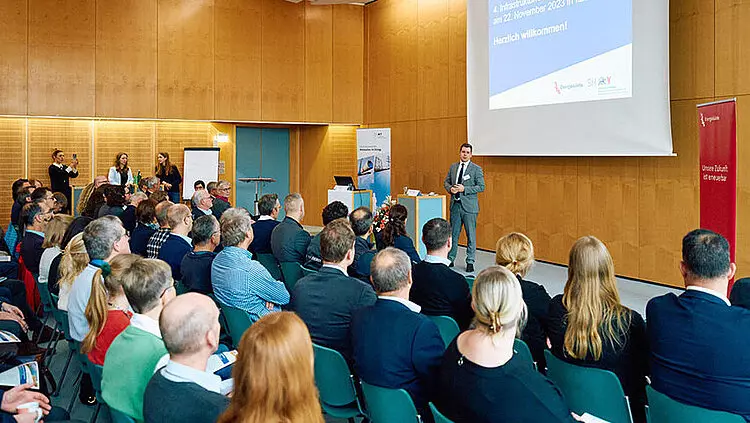Stakeholders from the regional economy, research, politics and local authorities discussed the next steps for the energy transition at the 4th Infrastructure Forum Energieküste at the Fraunhofer Institute for Silicon Research in Itzehoe today. The focus was on the further expansion of the hydrogen economy and the energy pipeline infrastructure. The opportunities for companies to settle on the west coast as a result of the planned infrastructure expansion were also discussed.
"The Energieküste offers the best conditions for the development of the green hydrogen economy. Hydrogen production should take place where green energy is readily available," explained State Secretary for Energy Joschka Knuth.
As energy pipelines are also climate protection infrastructure, the current discussion about the climate neutrality grid of the future is so important. New lines are needed to transport North Sea electricity and for the further expansion of wind energy in the north - both in the extra-high voltage grid and in the distribution grids. "The planning for new lines must keep pace with the expansion of renewables," said the State Secretary.
Claudius Teske, District Administrator of the Steinburg county, added: "Citizens are experiencing the energy transition at first hand, partly due to the rapidly changing landscape. In order to maintain acceptance in the region, it must also be possible for local citizens to recognise and feel the added value of the expansion of the energy infrastructure." Teske went on to emphasise: "Steinburg and the entire Energieküste must be actively integrated into the value chain. The Fraunhofer ISIT as today's venue is a good example of how the regional economy can benefit from the transformation process on the Energieküste."
Background
The Infrastructure Forum Energieküste is a joint event format organised by the Energy Transition Ministry of Schleswig-Holstein and the Energieküste (energiekueste.eu). The Energieküste is a project of the West Coast Regional Cooperation, an association of the districts of Dithmarschen, North Frisia, Steinburg and Pinneberg, the business development organisations egw:Wirtschaftsförderung, WEP, WFG North Frisia as well as the Flensburg Chamber of Industry and Commerce and the Kiel Chamber of Industry and Commerce (rk-westküste.de).
A conurbation of electricity generation from renewable energies is emerging on Schleswig-Holstein's west coast. For this reason, the electricity grid (distribution and extra-high voltage grid) on the Energieküste has been expanded for many years to meet the requirements of the energy transition, for example with the new 380 kV west coast line and an extensive 110 kV high-voltage grid expansion in the region. In recent months, both the federal government and the state of Schleswig-Holstein have updated their hydrogen strategies and set even more ambitious targets and measures. Based on its experience with the 2020 state hydrogen strategy, Schleswig-Holstein is primarily expanding the infrastructure and utilisation sections.
In addition to the extra-high-voltage lines that have already been completed, further power lines will be added in Schleswig-Holstein according to the transmission system operators' plans for a so-called climate neutrality grid. Several new grid connection systems for offshore wind energy are planned for the further expansion of offshore wind energy, which is set to play a key role in Germany's energy supply by 2045.
There will also be a need for hydrogen long-distance pipelines for hydrogen projects on the Energieküste in the future. As the use of natural gas as a fossil fuel will be replaced by renewable energies and hydrogen in the medium and long term, the conversion of the gas grids for the development of a hydrogen economy must already be considered today. Accordingly, the largely completed ETL 180 gas pipeline from Brunsbüttel to Hetlingen is currently being built "H2-ready". Once it goes into operation, which is planned for the turn of the year 2023/24, it will initially transport natural gas (landed in Brunsbüttel as liquefied natural gas (LNG)), but later increasingly and by 2043 at the latest hydrogen.
Download
Currently only available in German
> Press release from the state government of Schleswig-Holstein
> Website Ministry for Energy Transition, Climate Protection, Environment and Nature


